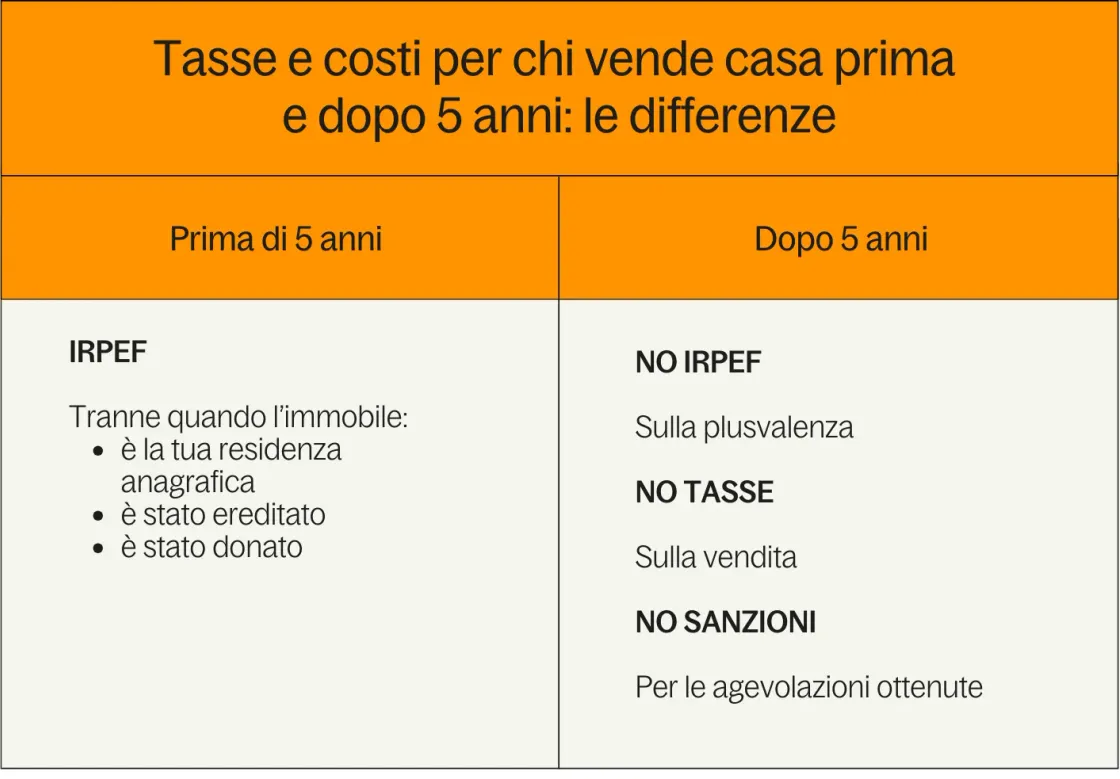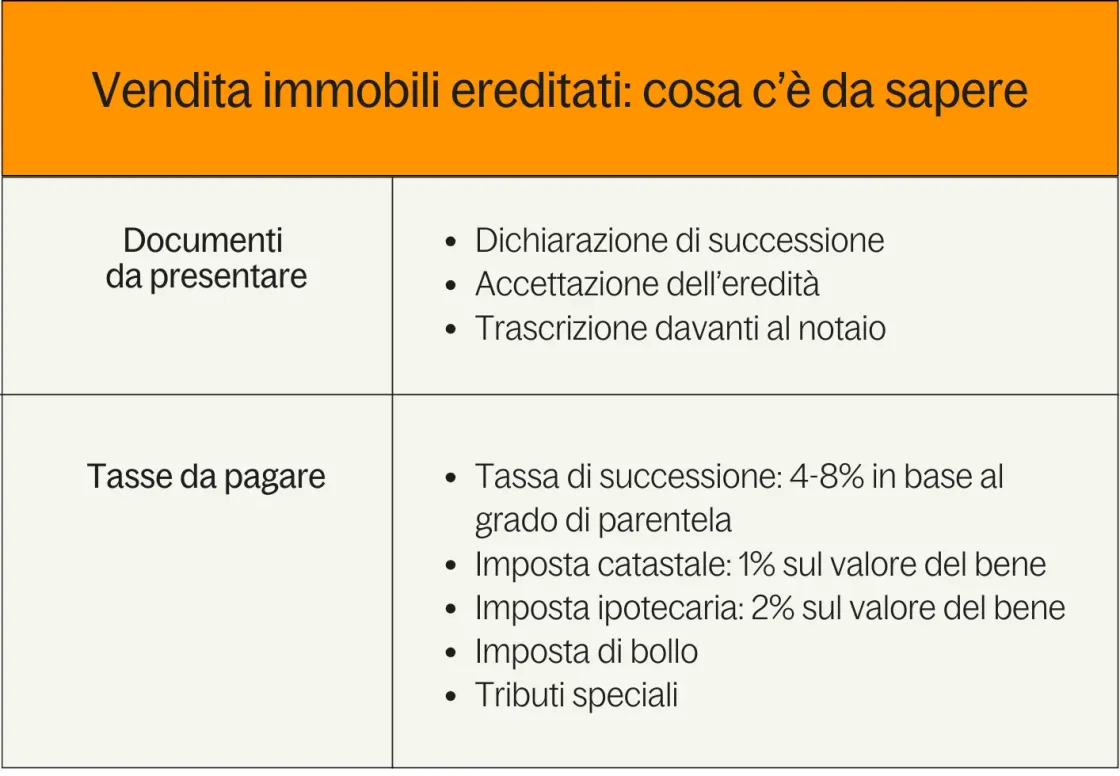Index
If you are thinking of selling a property, it is very important to know in detail the taxes on the sale of the house. The sale of a house by a private individual is generally tax-free, except in special cases. As a rule, the seller is not required to pay taxes on the sale of their home, even when it generates a profit. In some particular situations, however, whoever sells a house pays taxes, for example in the case of inherited properties or when the transaction generates a capital gain.
The law provides different rules depending on various cases, including:
- the type of building
- who lives in the property
- the time elapsed since the purchase
- the way the owner came into possession of it.
When do you pay taxes on the sale of a property?
Navigating the intricate bureaucracy of real estate transfers can be quite confusing. Let's see together how to get out of this complex regulatory labyrinth and what are the cases in which those who sell a house must pay taxes:
Taxes for those who sell their first home after 5 years of purchase
When you put your first home up for sale after 5 years from purchase you have no obligation to pay Irpef on the capital gain, nor any other form of tax.
Even if you have taken advantage of tax breaks such as the first home bonus, you will not have to pay any tax on the sale of the house after 5 years from its purchase. The expiration of the five-year period allows you to resell the property without losing the right to the benefits or risking heavy penalties.
Taxes for those who sell their first home before 5 years from purchase
However, what taxes will you incur if you sell your home before 5 years? Here, this is the case in which you will have to submit to the payment of Irpef if the sale generates a capital gain, that is, when you are able to resell the property at a price higher than that paid at the time of purchase.
However, if the property satisfies one or more of the following conditions, you will be exempt from any form of taxation on the sale, even if it occurs less than 5 years after its purchase:
- you, as the owner (or your family members up to the third degree of kinship) have used the property as your main residence – or as your registered residence – for most of the period between the purchase and the sale;
- you acquired the property through inheritance;
- you received the property as a gift.
For this last point, more than 5 years must have passed since the purchase or construction of the house by the person who made the donation.

Taxes on the sale of a second home
Here is another of the most frequently asked questions relating to taxes: but if I sell my second home, do I have to pay taxes?
When you sell your second home and generate a profit, two possible scenarios open up:
- if the second home If it was purchased more than 5 years ago, no payment will be due;
- If the second home was purchased less than 5 years ago, the capital gain generated from its sale for consideration will be subject to taxation.
Now let's see together what the taxes on the sale of a second home are. The profit generated can be taxed in two different ways. The first solution is ordinary taxation, which includes the gain obtained from the sale of the property in the tax return among "other income". The second method is separate taxation, which involves the application of a substitute tax of 26%, often more convenient than ordinary taxation.
Irpef brackets Income Rate 1 up to €15,000 23% 2 from €15,001 up to €28,000 27% 3 from €28,001 up to €55,000 38% 4 from €55,001 up to €75,000 41% 5 over €75,000 43%
As you can see from the Irpef bracket table, those with an income above €15,001 will pay a higher rate (starting from 27%) than that provided for by the separate taxation system which, as we have seen, is equal to 26%.
Taxes on the sale of inherited properties
Inheriting real estate is often a great fortune, but it may be that the most sensible choice is to proceed with its sale. Let's see together what are the elements to take into account when you are preparing to sell a property acquired through inheritance.
The inheritance declaration
The first step in selling an inherited property is to pay the taxes that amount to it. The amount to be paid will be calculated in the inheritance tax return, a document to be submitted within one year of the owner's death, which contains the list of all the deceased's assets and related values.
You can draft this document completely independently, using the appropriate software from the Revenue Agency. Alternatively, you can rely on an accountant, a notary, or a lawyer to support you throughout the inheritance tax payment process. The rates vary from 4 to 8% depending on the degree of kinship between the deceased and their heir. In certain cases, there is also a minimum fixed value – called a deductible – to be paid in addition to the value of the house.
What taxes must be paid before submitting the inheritance tax return? As in an ordinary sale, there are two taxes to be paid:
- the land registry tax, with a rate of 1% on the value of the property;
- the mortgage tax corresponding to 2%.
In addition, in the case of inheritance, the stamp duty, the mortgage tax and the special taxes (for example, secretarial fees) will have to be paid.
Acceptance of the inheritance
If you have the will to sell, you must add two steps to the inheritance declaration: the acceptance of the inheritance and the transcription of the same.
The acceptance act of the inheritance can have two forms: express, when the heir expresses the will to accept the assets subject to the inheritance, through a formal declaration to a Public Official, or through an authenticated private deed.
The transcription of the acceptance of the inheritance takes place before a notary and to proceed you will have to present the death certificate of the deceased and the deed of succession.
Notary fees for the sale of a house: who is responsible?
According to art. 1475 of the Civil Code, the costs of the sale of a property are borne by the buyer, unless otherwise agreed. The law specifically refers to the costs of drawing up the public deed and its subsequent copying in the land registry.
How much does a notary cost to sell a house? There are four notary fees related to the purchase of a property:
- the land registry tax of €50;
- the registration tax equal to 9% of the cadastral value of the property;
- the mortgage tax of €50
- the value added tax, which ranges from 4% for a first home to 22% for the purchase of a luxury property.
The fee due to the notary and the fee for the preparation of the public deed fall on the buyer's pocket, who usually takes care of choosing the notary himself.
However, the law allows the parties to include a written exemption in the sales contract. You can then add a clause that establishes the equal division of costs between buyer and seller, or assign the entire responsibility to the seller.

Selling with Casavo
In this article we have seen how much it costs to sell a house, but As you already know, sales taxes aren't the only thing to worry about when you decide to sell a property. Selling a house in Italy is a process that can take several months, require numerous visits to your home, and often leave you with a lot of confusion about market prices.
Casavo was created to eliminate these obstacles and make the sales process smoother and less stressful: it takes care of the bureaucratic aspects, simplifying the procedures for all parties involved, and allows the seller to choose the right buyer, discovering, without signing any agreement in advance, who is really interested in the house they want to sell. Quick turnaround times, streamlined procedures, maximum peace of mind: Evaluate your property now.
Want to sell your home?
We'll buy it, even in 30 days, or we'll help you find the perfect buyer.
